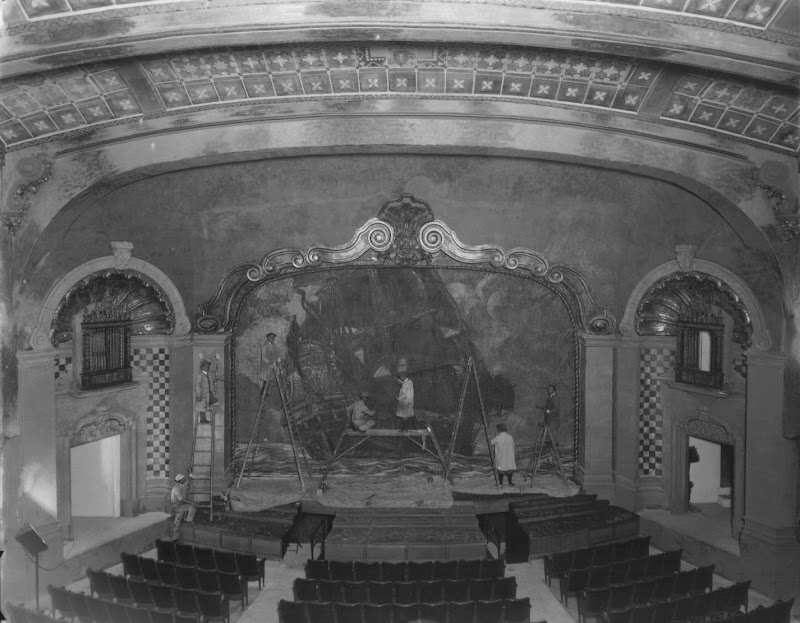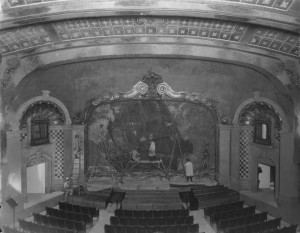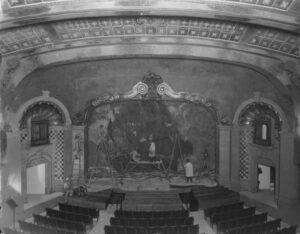The Meaning of Tribe
CATHY CARLTON, actress-producer
Here’s a helpful translation guide for those unfamiliar with Carlton’s idiosyncratic prose, or with the players to whom she refers:
“Richie”: actor-producer Rich Werner
“Kittie”: actor-producer Cathy Carlton, the author of this story.
“Bickie”: actor David Bickford
“Lynnie”: actress Lynn Odell
“Scottie”: actor Scott McKinley
“Noon”: actress, teacher, co-artistic director (Ghost Theatre Company) Katharine Noon
“Seldis”: director, co-artistic director (Ghost Theatre Company) Mark Seldis
“Rivera”: director/artistic director (Playwrights Arena) Jon Lawrence Rivera
“Bobby”: actor Robert Lane
“John”: actor John Allore
“Fitzy”: actor Tom Fitzpatrick
“Jahnke”: actor/performance artist John Jahnke
Carlton refers to one of the annual performance marathon fundraisers held at, and for, Hollywood’s Theatre of NOTE, on Cahuenga Boulevard. She currently lives in Massachusetts, where she grew up.
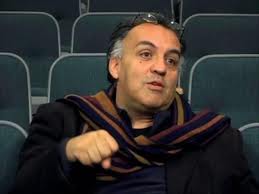
Luis Alfaro
“I saw him first at that Notey-ist of NOTE events, the Marathon. A freewheeling fundraiser held in January, the Marathon is a series of performances by guest artists usually starting in the early afternoon and going into the wee hours. The weirder the acts, the better, for us at NOTE. (I remember one year, some of us on the Art Board huddled to figure out how to get the blood off the floor).
“Richie, long time Marathon producer, started booking people at Thanksgiving. That one year, he buzzed about excitedly ,“Kitty, I got [writer-performer-poet-teacher, MacArthur Foundation “genius” Luis] Alfaro.” Me, swamped with admin and press stuff, for the company was all “yeah yeah, Alfaro, good , uh huh.” I had heard of Luis Alfaro, all the cool kids seemed to know him and I think he was fancy pants at the Taper at the time, but I had never met him or seen his work.
“Day of — between 11 p.m. and midnight. More people than should be are crammed into that black box on Cahuenga. Luis shambles onstage and puts a full bottle of tequila and a shot glass on the small table next to him. We look around at each other (well, this will be easier to clean up than blood.) And he starts to talk. And drink. Every two sentences, it seems, he takes a shot. We were mesmerized. I don’t remember the specifics of the monologue, but I still burn remembering the overall feeling. He spoke of his family, of Los Angeles, of his students, his commute, of crawling out from under, of food, of community, of what we have to do to get by as artists, all the while slugging that entire bottle of tequila. He got loud and passionate; we got loud and passionate. I remember thinking “how the fuck is it possible that this scruffy, beautiful Latino man can make sense of the world to this little white girl from the North Country. And how the fuck can he do it downing that bottle of tequila? Is this daddy gonna stay on his feet? Oh yes.
“That night, he spoke of his tribe. I looked around at my tribe then and, though I am now far away, I still do. Bicky on my left, Lynnie down front, Scotty in the back. I thought of the others in my orbit, Noon, Seldis, Rivera, Bobby, John, Fitzy, Jahnke, and I was just a bit less adrift.
“It’s a gift to be able to tell a story using an outside action distracting the audience. (I have since seen him tell a similar tale while stuffing himself with Twinkies.) The story remains the same, and I never forgot it.
“Fucking Luis Alfaro, man. Nice get, Richie.”
Dancing in the Dark
JOHN POLLONO, actor-playwright
John Pollono, performing in his own play Small Engine Repair at Rogue Machine. The play subsequently transferred to Off-Broadway.
“My favorite L.A. Theater moment happened in 2011 when we first opened Small Engine Repair as part of the late night series at Rogue Machine Theatre. It was a 10:30 p.m. show, we were about 10- minutes in when the power went out in front of a sold out house. For the first moments, Michael Redfield and I performed by the light of his iPhone. We kept thinking that tech director David Mauer (in the audience that night) would flip the circuit breaker — we didn’t know that the whole block had lost power. Instead, he made sure that Jon Bernthal made his entrance holding two flashlights. As the show chugged onward, whenever a character left stage to “use the bathroom” in the story, he would return with a lamp or a candle of some kind. We just kept slogging forward, knocking over bottles and chairs, not wanting to be the one to break the fourth wall and say ‘okay folks, this is ridiculous.’
“When Josh Helman made his entrance, we steered him away from the broken bottles and played to the pool of light in the center of the stage. By that point, flashlights had been distributed to the members in the audience and they were aiming them like weak spotlights on all the action.
“Afterwards, gathering out in front of the theater in the darkness with the post-show crowd (power wouldn’t be restored until the next day), we finally reacted to the whole damn thing. Kevin Spacey was there that night (of all nights!) and he told us about something similar happening to him in London and how they all forged ahead too. Seems like everyone has a crazy theater story like that. Thing is . . . while we were in the middle of it, we were imagining the story years later: ‘The lights went out and we performed by flashlight . . . and it was the most connected, organic performance I ever experienced.’
“But we all felt the complete opposite — we barely stumbled through.
“Not sure what this says about L.A. theater audiences, but gathering out there in front after the show, we realized that a big chunk of the audience thought the blackout was scripted. Someone even approached me and recommended that we write it into the text.”
What Actors Do
SHARON YABLON, playwright
“I would have to say my most memorable moment in LA theater was my introduction to the folks at Cinda Jackson’s Lost Studio about 20 years ago. I had just reluctantly moved back to LA from San Francisco and was planning on moving to New York to get a job in publishing. On a whim I decided to take a playwriting class at UCLA Extension, and playwright Kelly Stuart was a sub one session. I liked the writing exercises she had us doing, so I asked her if she knew of any playwriting groups that met. She told me to go down to the Lost Studio Saturday mornings and bring a few pages of new work, because actors just showed up.
“I didn’t know what to expect when I first climbed those stairs. There was actor and orator Mick Collins sitting at the center, talking about Communism. When that calmed down, writers started to have actors read their work, including Mick who is a great actor. Writer-actor Joe Goodrich (who now lives in New York), playwrights Guy Zimmerman and Wes Walker were there – people I still greatly respect and collaborate with. Peter Schaaf, Jeff Phillips, Tom Waldman, Charmaine Cruz and Mickey Swenson to name a few, were some of the actors.
“When it was my turn I gave someone my first scene, it was about a piano store owner who had a hooker living in the back of the store. When I first heard the actors bring the writing to life – without any direction or notes – it was like magic, and that’s my moment!
“I started to go every Saturday. There was so much incredible work and conversation about theater generated in that room over the years. Michael Farkash was also one of the writers whose work I was first introduced to. I’m still saddened by his death. His mind was so zany and macabre.”
Reflections on Zoe Caldwell
JOHN ACHORN, actor
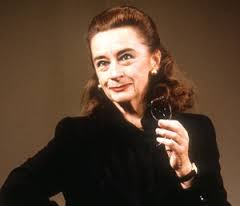
Caldwell in Master Class
Photo by Joan Marcus
“Because of my activity with Antaeus Company, and my participation the year earlier of Chekhov’s The Wood Demon at the Taper, I was offered an audition and subsequently a part in Master Class starring Zoe Caldwell [who played aging opera star Maria Callas as an exacting sadistic voice teacher].
“First of all, Ms. Caldwell is a First Lady of the stage. She was a gracious, if precise, personage. She was sexy even in her age – perhaps it was her sense of being open and, in turn, wanting her audiences to be open to their humanity; I think it gave her a sense of control in tandem with a sense of total spontaneous generosity. Fascinating. I wasn’t really close to her in any way, yet she gave me a feeling of being both integral and apart, without being disparaging.
“I played the Stagehand, a small role of the four roles in the play. Audra MacDonald was in the show straight off her breakthrough performance on Broadway in the revival of Carousel. People clamored to come backstage to give their regards to the cast. I was a bit in the shadows. During the previews, I would come out at intermission to dress the stage, and one night an usher asked if I was actually in the play.
“I met Angela Lansbury after opening night – she was congratulating the director David Loud et al, wandered by my dressing room, looked in and said (slightly astonished that she was speaking to me perhaps) “You were quite good too, very well done.”
“One evening, after the opening brouhaha was over and the run was on, there was suddenly this high-pitched humming sound that filled the theater, which at first we thought was the audience-headphone system going haywire. It continued off and on throughout the performance. By the second act, when we thought it was over, it came back, and Ms. Caldwell turned to the audience and said, ‘What shall we do about this? I’ve never experienced anything like this before!’ She actually, still as Callas cum Caldwell, offered them to come back to a different performance – ‘or should we carry on?’ A resounding assent to carrying on ensued — even with a sound irritating all concerned. She had them in the palm of her hand.
“She is truly the most remarkable actress I have ever known.”
Overcoming the Odyssey Theatre’s Closed-Door Policy
RHONDA ALDRICH, actress
“I was in a production of Happy Birthday, Tina Marie by Craig Thornton at the Odyssey Theatre. I played a former child star and had all these scenes where I relived my past roles. I was constantly changing costumes. Most of the changes were backstage, but for the last one I had to exit and change in the dressing room. Then I had to make this big entrance on a pogo stick — I was coming on to kill my mother (Sandy Martin) with the pogo stick and to sing a song called “The Rats are my Friends.” I raced out of the dressing room to the theatre’s backstage door, but someone had locked it while I was in the dressing room – and there was nobody backstage anywhere.
“I can faintly here Sandy through the door throwing her lines at me like ‘Where the hell are you!’ and I just start pounding on the door. Sandy keeps on talking and walks over to the door and throws it open – I pogo on and the rest is a blank!”
